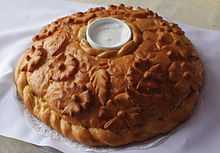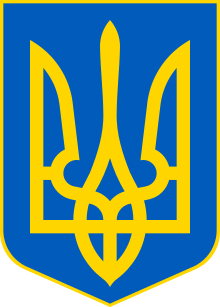Bread and salt

Bread and salt is a welcome greeting ceremony in many European cultures.
The tradition, known by its local Slavic names: Belarusian: Хлеб і соль; Bulgarian: Хляб и сол; Macedonian: Леб и сол; Croatian: Kruh i sol; Serbian: Хлеб и со; Polish: Chleb i Sól; Slovak: Chlieb a soľ; Czech: Chléb a sůl; Slovene: Kruh in sol; Russian: Хлеб-соль, Ukrainian: Хліб-сіль was also adopted by two non-Slavic nations — Lithuanians (Baltic) and Romanians (Latin) — both of which are culturally and historically close to their Slavic neighbours (Lithuanian: Duona ir druska and Romanian: Pâine și sare). It is also common in Armenia (Armenian: աղ ու հաց, agh u hats).
When important, respected, or admired guests arrive, they are presented with a loaf of bread placed on a rushnik (embroidered towel). A salt holder or a salt cellar is placed on top of the bread loaf or secured in a hole on the top of the loaf. In modern Russia, on official occasions, the "bread and salt" is presented by young women dressed in national costumes (e.g., sarafan and kokoshnik).
When this tradition is observed in spaceflight, appropriately small packages of bread and salt are used.[1][2]
Cultural associations
Bulgaria
Bread and salt (Bulgarian: хляб и сол, transliterated hlyab i sol) is a traditional Bulgarian custom expressing hospitality, showing that the guest is welcomed. The bread and salt is commonly presented to guests by a woman. Bulgarians usually make a certain type of bread for this occasion called pogacha, which is flat, fancy, and decorated. Regular bread is not usually used, although it may have been historically, but pogacha is much more common in this custom.
Usually, guests are presented with the pogacha, and the guest is supposed to take a small piece, dip into the salt and eat it. This custom is common for official visits regardless of whether the guest is foreign or Bulgarian. One notable example of this custom is when the Russians came to liberate Bulgaria from the Ottomans at the end of the 19th century. A common scene from that period was of a Bulgarian village woman welcoming Russian soldiers with bread and salt as a sign of gratitude.
Czech Republic and Slovakia (Slovak Republic)

This tradition is still practiced in the Czech Republic (chléb a sůl) and Slovakia (chlieb a soľ) for special occasions, for example, when presidents from other countries are visiting. It is not commonly practiced during daily life.
Russia
The tradition gave rise to the Russian word that expresses a person's hospitality: "khlebosolny". In general, the word "bread" is associated in Russian culture with hospitality, bread being the most respected food, whereas salt is associated with long friendship, as expressed in a Russian saying "to eat a pood of salt (together with someone)". Also historically the Russian Empire had a high salt tax that made salt a very expensive and prized commodity (see also Salt Riot).
There also is a traditional Russian greeting "Khleb da sol!" (Хлеб да соль! "Bread and salt!"). The phrase is to be uttered by an arriving guest as an expression of good wish towards the host's household. It was often used by beggars as an implicit hint to be fed, therefore a mocking rhymed response is known: "Khleb da sol!" — "Yem da svoy!" (Хлеб да соль — ем да свой! "Bread and salt!" — "I am eating and it is my own!").
With the advent of the Soviet space program, this tradition has spread into space. It was observed at the Apollo-Soyuz project, when crackers and salt tablets were used in the spaceship. Bread chunks and salt were a welcome at the Mir space station,[1][2] a tradition that was extended on the International space station.[2][3] Bread and salt are also a welcome for cosmonauts returning to Earth.[4]
In the Russian Orthodox Church, it is customary to greet the bishop at the steps of the church when he arrives for a pastoral visit to a church or monastery with bread and salt.
Poland
In Poland, welcoming with bread and salt ("chlebem i solą") is often associated with the traditional hospitality ("staropolska gościnność") of the Polish nobility (szlachta), who prided themselves on their hospitality. A 17th-century Polish poet, Wespazjan Kochowski, wrote in 1674: "O good bread, when it is given to guests with salt and good will!" Another poet who mentioned the custom was Wacław Potocki. The custom was, however, not limited to the nobility, as Polish people of all classes observed this tradition, reflected in old Polish proverbs. Nowadays, the tradition is mainly observed on wedding days, when newlyweds are greeted with bread and salt by their parents on returning from the church wedding.
Republic of Macedonia
In the Republic of Macedonia, this tradition still is practiced occasionally as a custom expressing hospitality. A certain type of bread, similar to that in Bulgaria and also by the same name — pogača (from Latin panis focacius) is prepared. As in Bulgaria it is common to prepare pogača at Christmas where, as part of the dinner, homemade bread with a coin hidden in it (placed inside before it was baked) is served.
The famous Macedonian and ex-Yugoslav ethno-jazz-rock group of even more famous world music guitarist, Vlatko Stefanovski, had the name "Leb i Sol", which means "bread and salt" and speaks itself about this term of hospitality as something basic and traditional.
Finland, Estonia and Latvia
In Finland, Estonia and Latvia, bread and salt were traditionally given as a symbol of blessing for a new home. Instead of white bread, dark fiber-rich rye bread was used.
Germany
Bread and salt are given away for different reasons:
- to the wedding for a lasting alliance between spouses
- to move into a house to wish sedentary, prosperity and fertility.
In northern Germany and Bohemia (Czech Republic) bread and salt are traditionally put into the diaper of a newborn. In Transylvania bread and salt are served to protect against weather demons.
Arab Culture
Arab culture also have a concept of "bread and salt" (خبز وملح) but not in the context of welcoming, but as an expression of alliance by eating together, symbolizing the rapprochement between two persons. Eating bread and salt with a friend is considered to create a moral obligation which requires gratitude. This attitude is also expressed by Arab phrases such as "there are bread and salt between us" (بيننا خبز وملح), and "salt between them" (بينهما ملح) which are terms of alliance.
Jewish Culture
The practice exists also among Jews in the Diaspora and in Israel. The ceremony of Kiddush includes soaking a piece of Challah in salt. Bread and salt are also used in welcoming ceremonies and given to the welcomed persons. It is common in Israel for a landlord or real estate agent to leave bread and salt in the home to welcome new tenants, as these should be the first things brought into a new home.
In fiction
The custom of serving bread and salt is a recurring reference in George RR Martin's A Song of Ice and Fire novels, where the ritual serves as not only a welcome but a sacred bond of trust and honor between host and guest, that neither shall harm the other.
References
| Wikimedia Commons has media related to Bread and salt. |
- ↑ 1.0 1.1 http://news.google.com/newspapers?nid=894&dat=19950317&id=gyYOAAAAIBAJ&sjid=mn0DAAAAIBAJ&pg=6611,2108414
- ↑ http://www.smh.com.au/news/World/Feast-of-bread-and-salt-awaits-space-station-crew/2005/04/17/1113676650147.html
- ↑ http://www.redorbit.com/news/general/146225/capsule_brings_3_astronauts_back_to_earth/
- R. E. F. Smith, David Christian, Bread and Salt: A Social and Economic History of Food and Drink in Russia (1984) ISBN 0-521-25812-X
| |||||||||||||||||||||||||||||
